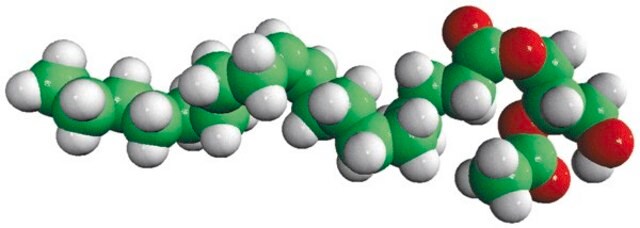850699P
Avanti
08:0 PE
1,2-dioctanoyl-sn-glycero-3-phosphoethanolamine, powder
Synonym(s):
PE(8:0/8:0)
Sign Into View Organizational & Contract Pricing
All Photos(2)
About This Item
Empirical Formula (Hill Notation):
C21H42NO8P
CAS Number:
Molecular Weight:
467.53
UNSPSC Code:
51191904
NACRES:
NA.25
Recommended Products
Assay
>99% (TLC)
form
powder
packaging
pkg of 1 × 10 mg (850699P-10mg)
pkg of 1 × 25 mg (850699P-25mg)
manufacturer/tradename
Avanti Research™ - A Croda Brand 850699P
lipid type
cardiolipins
phospholipids
shipped in
dry ice
storage temp.
−20°C
SMILES string
[H][C@@](COP([O-])(OCC[NH3+])=O)(OC(CCCCCCC)=O)COC(CCCCCCC)=O
General description
Phosphatidylethanolamine (PE) is a glycerophospholipid. This nonbilayer-forming phospholipid has a cone shape due to the presence of its head group.
Application
08:0 PE (1,2-dioctanoyl-sn-glycero-3-phosphoethanolamine) may be used in the preparation of DOPC liposomes for pH sensor conjugation in imaging pH changes in living cells.
Biochem/physiol Actions
Phosphatidylethanolamine (PE) plays a vital role in the structure and function of eukaryotic membranes. It serves as a lipid chaperon. It is known to participate in the initiation of autophagy. The hexagonal phase of PE is involved in membrane fusion events.
Packaging
5 mL Clear Glass Sealed Ampule (850699P-10mg)
5 mL Clear Glass Sealed Ampule (850699P-25mg)
Legal Information
Avanti Research is a trademark of Avanti Polar Lipids, LLC
Storage Class Code
11 - Combustible Solids
Certificates of Analysis (COA)
Search for Certificates of Analysis (COA) by entering the products Lot/Batch Number. Lot and Batch Numbers can be found on a product’s label following the words ‘Lot’ or ‘Batch’.
Already Own This Product?
Find documentation for the products that you have recently purchased in the Document Library.
Jungju Yoon et al.
Advanced materials (Deerfield Beach, Fla.), 26(26), 4559-4564 (2014-05-03)
Phase separation in films of phospholipids and conjugated polymers results in nanoassemblies because of a difference in the physicochemical properties between the hydrophobic polymers and the polar lipid heads, together with the comparable polymer side-chain lengths to lipid tail lengths
Ronja Marie Kühnel et al.
The Analyst, 144(9), 3030-3037 (2019-03-23)
The design of ion sensors has gained importance for the study of ion dynamics in cells, with fluorescent proton nanosensors attracting particular interest because of their applicability in monitoring pH gradients in biological microcompartments and reconstituted membrane systems. In this
Federica Gibellini et al.
IUBMB life, 62(6), 414-428 (2010-05-27)
The glycerophospholipids phosphatidylcholine (PC) and phosphatidylethanolamine (PE) account for greater than 50% of the total phospholipid species in eukaryotic membranes and thus play major roles in the structure and function of those membranes. In most eukaryotic cells, PC and PE
Dhaval Patel et al.
Oxidative medicine and cellular longevity, 2017, 4829180-4829180 (2017-08-09)
Phosphatidylethanolamine (PE) is the second most abundant phospholipid in mammalian cells. PE comprises about 15-25% of the total lipid in mammalian cells; it is enriched in the inner leaflet of membranes, and it is especially abundant in the inner mitochondrial
Our team of scientists has experience in all areas of research including Life Science, Material Science, Chemical Synthesis, Chromatography, Analytical and many others.
Contact Technical Service


![7,9-Di-tert-butyl-1-oxaspiro[4.5]deca-6,9-diene-2,8-dione certified reference material, TraceCERT®, Manufactured by: Sigma-Aldrich Production GmbH, Switzerland](/deepweb/assets/sigmaaldrich/product/structures/294/930/cd996125-79d8-4b2f-885c-f43d19084fc0/640/cd996125-79d8-4b2f-885c-f43d19084fc0.png)





